The flood of Genesis 6-8 is one of the most troubling passages of Scripture due to its violent portrayal of God. In general, there are three approaches to understanding the flood event.
1. Resistance is futile! Assimilate or die!
This view says this about Genesis 6-8:
It happened exactly as the text says, and God is sometimes very violent. Deal with it. If you don’t like this, God will probably be even more violent toward you in eternity when you burn in hell. But I love God, so He’ll be nice to me. And even though God said He would never again destroy the earth with water (Genesis 8:21), in the future, God will send a flood of fire upon the earth to destroy everyone again (2 Peter 3:6-7).
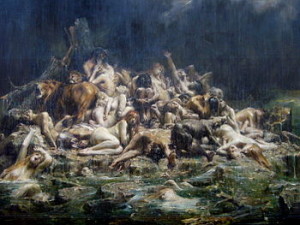 (Note: I include Greg Boyd’s “Divine Withdrawal” view in this category. He argues that God finally got fed up with the evil of mankind, and so He withdrew His divine hand of protection that was holding back the destructive floodwaters, thereby allowing them to destroy humanity. In this view, God didn’t do the destroying Himself; He simply stepped back to let the destroyer have its way with humanity. In a personal conversation with Greg Boyd, I related to him the following video clip, and he agreed that for the most part, it represents his position.)
(Note: I include Greg Boyd’s “Divine Withdrawal” view in this category. He argues that God finally got fed up with the evil of mankind, and so He withdrew His divine hand of protection that was holding back the destructive floodwaters, thereby allowing them to destroy humanity. In this view, God didn’t do the destroying Himself; He simply stepped back to let the destroyer have its way with humanity. In a personal conversation with Greg Boyd, I related to him the following video clip, and he agreed that for the most part, it represents his position.)
2. Flood? What flood? We don’t need no stinking flood!
This second view says this about Genesis 6-8:
The account is some sort of myth. Maybe it complete fiction. Maybe it’s a fable of some sort that teaches a lesson about God’s hatred of sin. Maybe there was some sort of local flood that might have happened a long time ago, but it certainly didn’t cover the earth and kill everyone. Whatever happened (if anything happened at all), it didn’t happen as the text says.
People who hold this view also reject the historical accuracy of many other passages in Scripture as well. Some will even reject the historicity of the miracles of Jesus, including His resurrection.
I have never been comfortable with calling anything in Scripture an error, partly because such an approach often allows people to simply pick and choose which passages they like and which ones they don’t, consigning the texts they don’t like into hermeneutical oblivion. In other words, writing off a text as “error” allows a person to avoid seriously studying and teaching that text, thereby ignoring or missing the deep truth(s) it contains.
3. The Correct View
(That’s a joke! I’m proposing a view, which I think has a lot of merit in Scripture…)
(Oh, and I believe the flood truly happened. I believe the worldwide flood is an historical event. There is lots of sociological and geological support for the flood, which I won’t dive into here. But regardless, my view of the flood can still be true even if there was no worldwide flood.)
Before I suggest a third view, note two things from the text:
1. People were violent before the flood (Genesis 6:5, 11, 13).
The stated reason for God sending the flood is because the earth was filled with violence. God seems opposed to how violent mankind has come, and so decides to do something about it.
2. People were violent after the flood (Genesis 8:21)
The flood brought no change to the evil and violent tendencies of the human heart.
Isn’t this strange? If the stated reason for the flood was to stop the violence of humanity, then God seems to have failed in His task of stopping violence. Is God so foolish that He couldn’t look at the hearts of humanity before the flood and see that even if He killed them all, the survivors and their descendants would continue to constantly live with evil hearts and violent lives?
To ask the question is to answer it. Of course God is not foolish! Something else must be going on behind the scenes.
So … Wait … God hates violence?
As soon as we start looking for what this “something else” might be, some other details from the text start to jump out from the page.
For example … God states at the beginning of the account that He is sorry He made mankind because they are so evil and violent (Genesis 6:6).
Ok, so God is opposed to violence. That’s a good thing.
But then … to show how opposed He is to all the violence that covers the face of the earth … God engages in the greatest act of violence possible by drowning all the people and animals on the earth (except for those on the ark)?
So to stop the violence that covers the earth, God sends a violent flood to cover the earth?
Something’s not right here.
Yes, “God is God and can do what He wants,” but this seems a bit over the top, even for God.
 Is this just a divine example of the bad parenting advice “Do as I say; not as I do?”
Is this just a divine example of the bad parenting advice “Do as I say; not as I do?”
If so, then since we become like the God we worship, it is no wonder that people were just as violently evil after the flood as they were before.
It is a very, very tiny step from believing that “God is extremely violent against evil people” to “God wants me to engage in violence against evil people.” Indeed, the rest of biblical history (along with all human culture) reveals this exact step taking place over and over and over again.
If God really is so violent, why wasn’t Jesus?
Jesus was adamantly opposed to all forms of murderous violence, even against His so-called “enemies.”
He didn’t call down fire from heaven, but rather rebuked His disciples for thinking such things (Luke 9:54). He didn’t call down angels to defend Himself (Matthew 26:53). He even told Peter to put away His sword, and then He healed the man that Peter has struck (Matthew 26:52).
Yes, Jesus cleansed the temple, but no human or animal died, nor does the text say anyone was even hurt (Matthew 21:12-17; Mark 11:15-19; Luke 19:45-48; John 2:13-16). Yes, Jesus told his disciples to buy a sword , but this was to fulfill prophecy; not so they could actually use it. And don’t even get me started on the book of Revelation.
If it is true, as Scripture says, that Jesus fully reveals God to us (John 1:14, 18; 14:9-11; 2 Cor 4:4; Php 2:6; Col 1:15; Heb 1:2-3), but Jesus was never violent, then we are faced with a choice: Either (A) God truly is violent and Scripture is lying when it says that Jesus fully reveals God to us, or (B) Scripture is not lying, and Jesus does truly reveal God to us, and therefore God is not violent, and we need to understand all those violent texts in some other way.
I go with Option B: Scripture is not lying, and Jesus is not violent, so neither is God.
Isn’t that a contradiction?
If Scripture is not lying, but Scripture says God is violent, while Jesus shows that God is not violent, isn’t this a contradiction?
It initially seems so.
But with one small little tweak on how you read the Bible, it all falls into place.
Most people think the Bible reveals God to us. And while it does to some extent, the ultimate revelation of God is found in Jesus Christ (whom we read about in Scripture, of course). But Jesus shows us how to read the Bible. Jesus provides the interpretive lens through which to study Scripture.
 And when we look to Jesus, and specifically the most violent aspect of the life of Jesus, His crucifixion, and we carefully see what is being done to Jesus on the cross, we discover something surprising.
And when we look to Jesus, and specifically the most violent aspect of the life of Jesus, His crucifixion, and we carefully see what is being done to Jesus on the cross, we discover something surprising.
God didn’t kill Jesus on the cross; we humans killed Jesus on the cross … and we blamed God for it. Humans killed Jesus and claimed they did so in God’s name, to fulfill God’s will.
But they weren’t fulfilling God’s will. They were doing the opposite. They were committing the greatest sin in human history. And they were completely ignorant of what they were doing. This is why Jesus prayed, “Father, forgive them, for they know not what they do” (Luke 23:34).
Through the cross, we see Jesus showing us how to understand the “violence of God.” The “violence of God” against Jesus on the cross is not God’s violence at all, but is rather the violence of humans which we then blame God for.
Since we (1) Believe God is violent, we (2) become like the God we worship by engaging in our own violence, and (3) justify our violent actions by blaming our violence on God.
But Jesus entered into this twisted framework of violent theology and blew it up from the inside. Through His death and resurrection, Jesus showed (1) that God is supremely non-violent and that (2) we humans are the violent ones.
Once we see this revelation of Jesus on the cross, we then discover that all the other violent portions of Scripture reveal exactly the same thing.
The violent texts of the Bible do not reveal God to us … they reveal us to us. The violent passages of Scripture are not a revelation of the heart of God; they are a revelation of the heart of humanity.
But humans didn’t send the flood!
So now we come back around to the flood. The flood event is extremely violent, and the text blames this violence on God. This fact invites us to read the flood through the lens of the crucifixion.
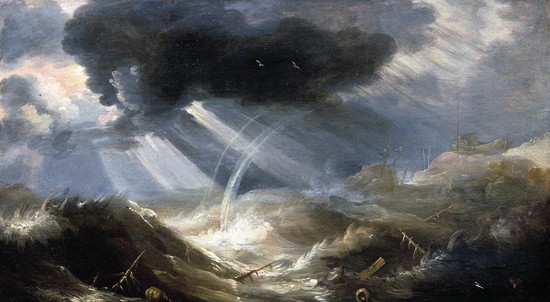
And when we do, we realize that the flood account of Genesis 6–8 sounds like the explanation that is offered for any natural disaster throughout human history.
“God sent Hurricane Katrina on the people of New Orleans because of Mardi Gras and Voodoo.”
“God sent the Indonesian Tsunami because the people there are Muslim and Hindu.”
“God caused my neighbor to get in a car wreck because he said some profane things about God when I invited him to church.”
Meanwhile, God, through Jesus Christ, is saying,
“NO! No no no no no! Please stop saying such things! I didn’t send those storms. I didn’t kill those people. I love them and forgive them as my own children! It was a terrible disaster that happened to those people, and my only involvement is to weep and mourn with them, while calling you to go help them!
“But as long as you think I am punishing them, you will continue to sit and gloat at the disaster that has come upon your enemies. But your enemies are not my enemies, for I have no enemies. I call you to love your enemies, for they are my children too.”
So What Happened in the Flood?
I believe the flood account of Genesis 6–8 was written many thousands of years after it actually happened, and is therefore a human explanation for an actual historical event. I believe it is an inspired and inerrant account of the human explanation for a natural disaster, and as such, it invites us to see how we humans explain natural disasters today.
The flood event of Genesis 6-8 contains all the signs of a human rationalization for a violent natural disaster:
The people committed great sin (Genesis 6:1-4) and became monsters. They were so bad, they did nothing but evil all the time (Genesis 6:5, 11, 13). And so God destroyed them all! Yay! But … it didn’t really work, because we’re still pretty violent. So be careful … If you sin against God, He might destroy you too!
Do you see? A flood did occur. It was a terrible natural disaster unlike anything the world had ever seen. After the fact, the few survivors started to postulate about why such a disaster occurred, and, just like every human before and since that time, they decided that God sent the disaster to punish humans for their sin.
But now, in Jesus, we have learned that this is not what God does. So when we read the flood account of Genesis 6–8, we no longer read it as a warning about what God might do to us if we sin, but rather as a warning about how we will be tempted to think and act when we see bad thing happen to other people.
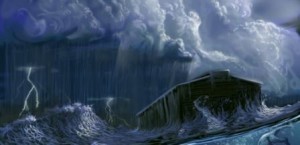 Looking at our face in the mirror of Genesis 6–8, we must ward ourselves against the common human practice of condemning others when bad things happen to them. We must stop saying, “Well, he lost his job and got cancer, so God must be punishing him for some secret sin.” (Remember Job?) Instead, when bad things happen to people, we must, like Jesus, enter into their hellish pain and sorrow, and help them or love them in in any way we can.
Looking at our face in the mirror of Genesis 6–8, we must ward ourselves against the common human practice of condemning others when bad things happen to them. We must stop saying, “Well, he lost his job and got cancer, so God must be punishing him for some secret sin.” (Remember Job?) Instead, when bad things happen to people, we must, like Jesus, enter into their hellish pain and sorrow, and help them or love them in in any way we can.
When bad things happen to others, we must remind them (and ourselves) that God did send the disaster and is not punishing them for sin. Instead, He is with them in their suffering and grieving for their loss.
So the flood account is a hard text to read. Not because it reveals a God before whom we must cower in fear and trembling, but because it reveals to us the blackness of our own sinful hearts when we prefer to condemn others in God’s name rather than help them through their pain.
The next time something bad happens to a family member, friend, or foe, how will you respond?
This post was part of the September 2018 Synchroblog on the topic of the flood. Here are the other contributors to this month’s topic. Go and read them all!
- The Flood Story – K. W. Leslie
- A Flood of Insightful Hope – Jordan Hathcock
- There will Never Be a World Wide Flood Again but Was There Ever One in the First Place? – Done with Religion
- The Flood as a Foreshadowing to the Cross of Christ – God is Not like Thanos from the Infinity War – Scott Sloan\
- The Great Flood: 7 Amazing Lessons Every Christian Needs To Know – Joseph A. Brown
- Is God like Thanos from the Avengers Infinity War? – Scott and Sadie
- The Flood is a Remedy for Corruption – Tomasz Leszczynski
- Did God Really Drown Millions in the Flood? – Mike Edwards





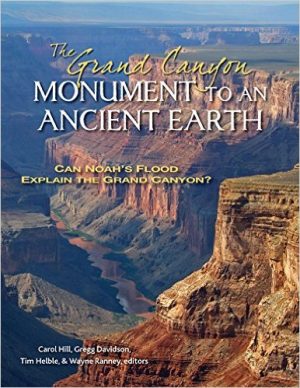

 Remember Andrea Yates? She is the mother who, in 2001,
Remember Andrea Yates? She is the mother who, in 2001, 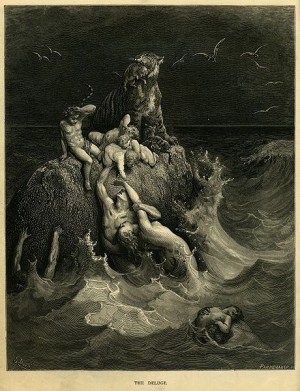 On the one hand, we say, “There is no way God told these mothers to drown their babies,” but then we turn around and say, “God drowned millions of babies during the flood.”
On the one hand, we say, “There is no way God told these mothers to drown their babies,” but then we turn around and say, “God drowned millions of babies during the flood.” If Jesus is a God who drowns babies because “They’re the devil!” and then rides His horse through a lake of blood from His slain enemies because “They wouldn’t worship me!” (Duh! You drowned millions of their babies!), I’m just not sure this sort of God is worthy of our worship.
If Jesus is a God who drowns babies because “They’re the devil!” and then rides His horse through a lake of blood from His slain enemies because “They wouldn’t worship me!” (Duh! You drowned millions of their babies!), I’m just not sure this sort of God is worthy of our worship.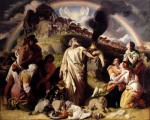
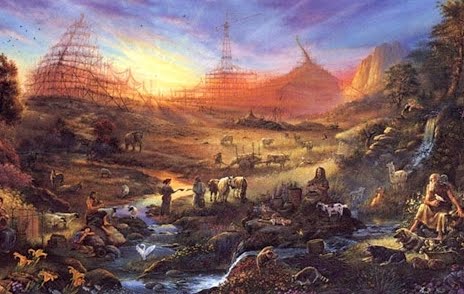
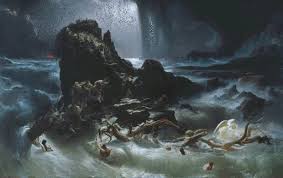 Through the story of the flood, the author of Genesis is telling his readers to understand that when we form our thoughts after evil instead of after God, only death and destruction follows. Noah serves as a positive example of what happens to those who follow God and faithfully obey Him, even though the entire surrounding society and context is engaging in evil continually.
Through the story of the flood, the author of Genesis is telling his readers to understand that when we form our thoughts after evil instead of after God, only death and destruction follows. Noah serves as a positive example of what happens to those who follow God and faithfully obey Him, even though the entire surrounding society and context is engaging in evil continually.
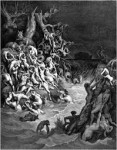
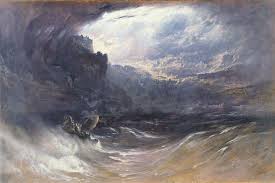 When bad things happen in this world, God often takes the responsibility for them because He is the one who created a universe where such evil things are possible.
When bad things happen in this world, God often takes the responsibility for them because He is the one who created a universe where such evil things are possible.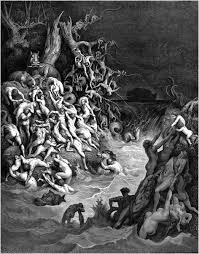 And every living substance was destroyed which was upon the face of the ground, both man, and cattle, and the creeping things, and the fowl of the heaven; and they were destroyed from the earth: and Noah only remained alive, and they that were with him in the ark.
And every living substance was destroyed which was upon the face of the ground, both man, and cattle, and the creeping things, and the fowl of the heaven; and they were destroyed from the earth: and Noah only remained alive, and they that were with him in the ark. How can a God who says "Love your enemies" (Matthew 5:44) be the same God who instructs His people in the Old Testament to kill their enemies?
How can a God who says "Love your enemies" (Matthew 5:44) be the same God who instructs His people in the Old Testament to kill their enemies?
